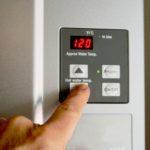Your hot water heater might be the hardest-working appliance that you never have to think about.
Until you do have to think about it. That’ll happen about once every decade, which is how long the average hot water heater lasts.
If you’re reading this post, you might be at the ten-year mark, give or take, with your hot water heater. Perhaps your showers aren’t quite as steamy as you’d like, or you’re seeing signs of wear and tear on your tank.
Or maybe you have a newer hot water heater that isn’t performing to expectations.
Whatever the case, we find that customers who are trying to diagnose water heater issues, or who are deciding whether they should repair or replace a water heater, ask a common set of questions.
Following is a list of the hot water heater questions we get most often, and below that are our answers.
Which brand of hot water is best?
How much do hot water heaters cost?
Should I consider a tankless hot water heater?
What size hot water tank do I need?
At what temperature should I set my hot water heater?
How long do hot water heaters last?
How do I know if I should repair or replace my hot water tank?
What should I do to maintain my hot water tank?
Let’s get going!
Which brand of hot water heater is best?
When it comes to brands of water heaters, there is not a huge quantity or variety out there. Essentially, hot water heaters are tanks that hold a certain amount of water and are powered by gas or electricity. In our experience, differences among brands with respect to quality are relatively minor.
The differences among water heater companies can be more obvious. Some companies have better customer service than others.
At Kowalski, we’ve been impressed with A.O. Smith and their water heaters. They’re a great company to deal with and they back their products, which are high quality.
There are three or so other brands that we tend to go with as well, depending on the products they have in stock, how fast they can deliver, and what our customers need.
All the water heater companies we deal with build quality products, which only rarely have issues. And all have excellent warranties that cover issues should they occur.
How much do hot water heaters cost?
The cost for a standard water heater – a storage tank model as opposed to a tankless model, which we discuss a bit later in this post – depends on a variety of factors:
- Purchase price. A hot water tank can cost $500 to $2000 or more, depending on its capacity and fuel type. Electric hot water tanks tend to have a lower purchase price than gas hot water tanks do, simply because electric tanks have fewer parts.
- Venting type. Gas tanks use either a natural flue vent (a metal line in a chimney) or a power flue vent (a plastic liner on the exterior of a home). Tanks that use natural flues are less expensive than those that use power flues.
- Energy costs. Another factor in the overall cost of your hot water tank is powering it each month. Gas water tanks have the edge here. They may have a higher purchase price than electric water tanks, but gas water tanks are more energy-efficient, and thus less expensive to run.
If you’d like to estimate your water heater energy costs, the U.S. Department of Energy provides an online cost calculator for electric and gas water heaters. This tool factors in tank capacity and your daily usage volume, so it can be pretty helpful.
- Supply chain issues. Hot water tank prices have been rising recently. The materials shortages and manufacturing issues affecting many industries have impacted plumbing too. Over the course of the last year, we’ve seen the price of hot water tanks double, usually increasing by around five percent each month. So our purchase price estimate of $500 to $2000 is just that – an estimate.
Should I consider a tankless water heater?
Tankless water heaters are also called on-demand, instantaneous, or endless hot water. They work by heating water only when you turn on a faucet. This is in contrast to a tank-style water heater, which must keep a reservoir of water at a consistent temperature at all times.
If you are deciding whether a tankless hot water heater is right for you, here are some points to consider:
- The purchase price of a tankless hot water heater. Until recently, tankless models were significantly more expensive than storage models. But the price of tanks has increased dramatically over the past few years, whereas the price of tankless models has remained more stable. So today, the purchase price is not the difference-maker it once was. The price of a tankless model is about the same as the price of a large-capacity, quality hot water tank.
- The type of fuel you have in your home. If you have natural gas, you’re a bit better positioned for a tankless water heater. In our experience, gas-powered tankless water heaters are more efficient than electric ones. This is because on-demand hot water must be flash burned in order to supply the gallon-per-minute volume that you ask for. A lot of electricity is required for that, which puts a burden on your circuit breakers.
- Fuel efficiency. Tankless water heaters are usually more fuel-efficient – which means cheaper to run – than tank-style water heaters. In fact, the U.S. Department of Energy estimates that tankless water heaters are anywhere from 8% to 34% more energy-efficient than storage models. This is because a tankless water heater uses energy only when you turn on a faucet, whereas a tank-style water heater uses energy continually. For example, over the course of a night, a gas heater will warm a tank three times to keep the water hot inside.
- Energy savings. This is directly related to fuel efficiency, as you’ve probably already guessed. But it also depends on the amount of hot water your household uses. The more you use, the more often your tankless water heater must run, and the less energy efficient it becomes compared to a tank-style model. If you’d like to calculate how much water your household uses, here’s a handy water footprint calculator.
- The wait time for hot water. The alternative names for tankless water heaters can confuse customers. Tankless does mean “endless” hot water, but it does not mean “instantaneous” hot water.In fact, when you install a tankless hot water heater, you may find yourself waiting a little longer for hot water, depending on the location of the faucet you’re using. This can lead customers to believe something is wrong with their tankless water heater. Not at all! We’ll explain:
A tank-style model heats water consistently throughout the day. This heat radiates, so it travels the pipeline, warming the idle water there. When you turn on the hot water at almost any faucet, it’s already somewhat tepid and needs less time to heat up.
In contrast, a tankless model heats water only when you’re using it. The idle water in the pipeline stays cold. If you turn on the hot water at a faucet that’s, say, 40 feet of the pipeline away from the heating elements, that’s 40 feet of very cold water that runs for a minute or so. Customers tell us they notice this wait time for hot water.
Tankless models do heat the water quickly, though, so the wait time is never very long.
- Power outages. If you live in an area with frequent power outages, a tank-style water heater may be better for you. The reservoir of water will remain warm for some time after the power goes out, so you’ll have hot water for a while even if you don’t have power. With a tankless water heater, however, any power outage will render your household instantly without hot water until power is restored.
What size hot water tank do I need?
We typically recommend the following hot water tank capacities for the following sizes of households:
- 1-3-person household: 40-gallon tank
- 3-5-person household: 50-gallon tank
- 5-7-person household: 75-gallon tank
As always, though, each household is different. You may have additional considerations regarding your hot water. Do you have frequent guests? Take more or longer showers? Do more dishes or laundry? The answers to these questions will help determine the tank capacity you need. We’re happy to work through these questions with you!
At what temperature should I set my hot water heater?
We recommend that you set your water heater to a temperature of 125°F to 135°F. For most households, this temperature range strikes a good balance with respect to safety, comfort, and energy efficiency. Here’s what we mean by that:
- Safety: If you set your water heater temperature below 120°F, you risk the growth of bacteria in your tank. If you set your water heater temperature above 135°F, you risk scalding yourself or your family members with the water coming from the hot faucet.
- Comfort: Most showers and baths are best at a water temperature of 110°F to 120°F, due to the sensitivity of the skin.
- Energy efficiency: At a temperature above 135°F, your hot water heater is essentially cooking your water, and it has to fire a lot more often. If you find that you need a temperature above 135°F to make your hot water last longer, then what you really need is a larger-capacity tank.
How long do hot water heaters last?
Following are some general rules for hot water heater longevity:
- Gas hot water tanks last 8-10 years, on average, and cost less to run than electric tanks.
- Electric hot water tanks last 10-12 years, on average, and cost more to run than gas tanks.
- Tankless hot water heaters last 15-20 years, on average.
The lifespan of your hot water heater is also affected by:
- The volume of hot water you use. A hot water tank is a mechanical device, and like all mechanical devices, it deteriorates over time with wear and tear. Heavy usage often (but not always!) means a shorter lifespan.
- The hardness of your water. Hard water tends to reduce the lifespan of hot water tanks. This is because hard water leaves sediment inside your tank, which can cause overheating and erosion.
So, what about our water in Pittsburgh – is it hard? Well, water is hard when it has a larger volume of dissolved calcium, magnesium, and other metals in it. Here in the Pittsburgh area, our water contains about 136 milligrams of these metals per liter.
According to the United States Geological Survey, Pittsburgh water is indeed hard water. The scale goes like this: 0-60 mg/L is soft; 61-120 mg/L is moderately hard; 121-180 mg/L is hard, and anything above 180 mg/L is very hard.
How do I know if I should repair or replace my hot water tank?
If your hot water heater is leaking, or if it’s not producing enough hot water to meet your typical daily demand, it might be time to repair or replace it.
To determine whether a repair or a replacement is best for you, we look at two primary factors:
- The warranty on your hot water tank. Most hot water tank warranties are for six years. If your warranty is still valid, we typically recommend a repair as a first step. In this case, you should contact the manufacturer of your tank. Manufacturers supply their own repair technicians for hot water heaters under warranty, which minimizes or even eliminates any cost to you.
- The age of your hot water tank. If your hot water tank is approaching advanced age, and particularly if the warranty has expired, you might want to consider installing a new one. Often the fix for an older hot water tank comes with a hefty cost, making a replacement a much better value than a repair.
Hot water tank repair services have become a specialized industry – there are companies now that do only this. So if you are looking to repair an older tank, you may be better served by one of these specialized companies. As a plumbing contractor, Kowalski is better suited for replacing rather than repairing older hot water tanks.
What should I do to maintain my hot water tank?
Besides setting your tank to an optimum temperature between 125°F to 135°F, the one task we recommend homeowners do to keep their tanks in top condition is to drain them once per year.
Some amount of sediment collects in any tank and “cooks” as the tank heats the water day after day. This eventually causes erosion and leaks. Yearly draining can help.
While you can drain your hot water tank on your own, the combination of water and power involved in this task is a safety concern. It’s best to absolutely know what you are doing, or to learn from an experienced professional, before attempting it.
If you’d like to drain your water tank, Kowalski would be happy to do this for you. We can also show you how so that you can tackle it yourself next time.
Note that draining your tank is not a guarantee that it will last longer than its average lifespan. Yearly draining is definitely a good practice that produces a cleaner, healthier tank. But we know customers who drained their tank every year and still had to replace it in six years. We also know customers who never drained theirs and it lasted for twenty. These are extreme examples, but they show how machinery can be unpredictable.
Can hot water tanks freeze?
Given the plunging temperatures and occasional ice storms of a Pittsburgh winter, many of our customers have experienced frozen pipes. They are understandably concerned about a frozen water tank.
The good news is, a hot water tank rarely freezes – there’s just too large a volume of water in it to freeze solidly.
The not-so-good news is, in the extremely unlikely event that your hot water tank freezes, your house is already in jeopardy. A water tank would freeze only after your pipes have already frozen and burst. We have never seen this level of wintertime destruction, and we’re confident it won’t come to pass in your home.
_____________
We hope we were able to answer all your hot water heater questions today and help with any research you’re doing!
If you have any questions we haven’t covered here, or if you’d like to chat about potentially replacing your hot water heater, contact us. We’d love to hear from you.





